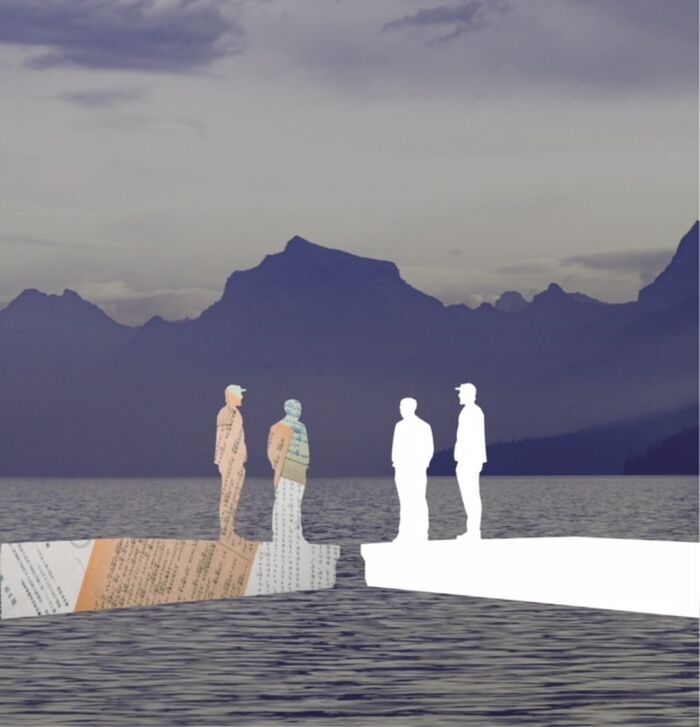I’m Having a Wonderful Time in BADEN-BADEN review
This piece of new-writing is drenched in oranges and uncertainty, and deserves so much attention

I don’t want to spoil this show for you by saying too much. But what I do want to say is that you should go and see ‘I’m Having a Wonderful Time in BADEN-BADEN’, whatever it takes.
Picture the room. There is a bed on one side, a hanging window-frame on the other. A desk at the front, with a bottle of Christmas wine standing on it. Everything is white, ‘the flat white of amnesia’. The only sense we have of time is the light becoming brighter and then darker again, and the harmonies of Allie’s alarm clock set to a nostalgic radio station. The white colour of this room is thrown into relief by the orange of four packets of satsumas and the red of her sheets stained with period blood. The white walls become screens for projections, silent videos filmed with the shaky hand of a friend or of memory itself; these projections show us some of what cannot be explained in this play.
"Part of the beauty of this play is in the slow release of detail"
Maybe it’s weird that I have started my review with an abstract description, or that I haven’t done what a review normally does and outlined the premise of the play, the characters and the main plot lines. This is because I don’t want to spoil it. Part of the beauty of this play is in the slow release of detail: starting from the phone call where Allie only grunts in response, her speeches become longer and longer, her postcards moving away from banal formalities and whatever she feels she should say and towards something more honest, more painful, and more difficult to write. Amelia Hills controls the pace wonderfully as she moves from silence to frenzy and passes all the points in between.
Indeed Hills cannot be praised enough. While of course lots of credit must go to director Rosie Chalmers whose staging gloriously complements the lines and draws out with its gorgeously coherent aesthetic the complete isolation that Allie feels, Hills’ performance is almost faultless. She conveys a sense of hopelessness, of suppressed emotion and of uncertainty. Hills captivates our attention, and we feel like we cannot look away – we want to watch her in every movement of every moment.

She does not just play a part, she embodies it – even when this means biting into a whole satsuma and spitting it out again into her hand or massaging purple sparkly hair dye into her hair. The actor is not the same at the end of the play as at the beginning (she has purple glitter in her hair and she can taste orange peel) and there is something so powerful in Hills’ visceral engagement with the lines that she speaks. And what is more, she remembers, unprompted by any other character, over an hour’s worth of lines.
All the details are perfect, the acting is spot-on – now it’s time to turn to the writing. Jenny O’Sullivan’s language treads a line between the poetic and the conversational, the comic and the painfully poignant, capturing perfectly the sense that we are listening to Allie’s innermost thoughts, which sometimes twist and divert and sometimes pursue one image almost obsessively to its furthest possible point. That her words manage to captivate an audience for over an hour, with only a single character in a single room with a bed and a bloodstained sheet hanging over the window-frame, is something truly impressive. This is writing that speaks of a mature writer, processing feelings whose complexity and subtlety (or intensity) seems to defy words. She finds a perfect way of saying everything.
When you see this play for yourselves, you will see that I have not done justice to the emotions it expresses or the complex realities that it reveals, and most of all I have not even come close to exploring the powerful implications of self-address which comes to the fore in the final moments of this play. But the uncertainty is part of this play’s beauty, and I am not going to spoil that. We do not know what we know right from the beginning. Details are gradually revealed to us, as emotions are written down or spoken out loud or projected onto the blank walls behind Allie’s head. We feel what it is to be completely hopeless, to now know what to do except peel oranges and write postcards to people who might read them or may not even receive them. What O’Sullivan writes, what Chalmers directs, and what Hills presents is so important. This play deserves so much attention.
 News / Caius mourns its tree-mendous loss23 December 2025
News / Caius mourns its tree-mendous loss23 December 2025 News / Clare Hall spent over £500k opposing busway 24 December 2025
News / Clare Hall spent over £500k opposing busway 24 December 2025 Comment / Yes, I’m brown – but I have more important things to say22 December 2025
Comment / Yes, I’m brown – but I have more important things to say22 December 2025 Comment / The ‘class’ of Cambridge24 December 2025
Comment / The ‘class’ of Cambridge24 December 2025 Interviews / Politics, your own way: Tilly Middlehurst on speaking out21 December 2025
Interviews / Politics, your own way: Tilly Middlehurst on speaking out21 December 2025








